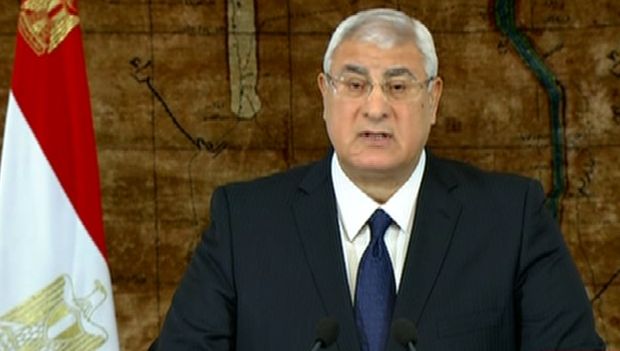
Egypt’s interim President Adly Mansour speaks at the presidential palace in Cairo, Egypt, on Sunday, January 26, 2014. (AP Photo/Egyptian State Television)
Cairo, AP—Egypt’s interim president on Saturday issued a much-anticipated decree governing an upcoming presidential election that clears the way for a vote many expect will be won by the country’s military chief.
Field Marshal Abdel-Fattah El-Sisi has not yet officially announced he will run for president, but it is a widely expected move. After the Interim President Adly Mansour’s legal adviser, Ali Awad, announced the move on state television, the election commission is expected to set the date for the vote in April, opening the door for candidates to run.
The election is a key step in a transition plan laid out by interim authorities in July after the army ousted President Mohamed Myrsi.
The decree protects the elections commission from legal challenges, a contentious position that had been opposed by one of Egypt’s top courts and criticized by potential candidates.
Awad said that Mansour made the decision after reviewing all legal opinions and after the Cabinet prepared a draft law. He cited the “nature of the transitional period” and said it was important to prevent delays for both the presidential and subsequent parliamentary election, which according to the constitution must be held no later than the second half of July.
When Mursi was elected in 2012, decisions by the presidential electoral commission were also beyond appeal. However, the new 2014 amended constitution states that no laws can be above review—part of the fallout from a spat between the judiciary and Mursi, who, while in office, issued a decree protecting his decisions from legal challenges. The decision at the time caused an outcry from judges.
Already, the decree is being criticized, casting doubt over a process the military-backed government hoped would shore up legitimacy after the ouster of Egypt’s first democratically elected president last summer. The country remains divided, authorities are intolerant of dissent and thousands of Mursi supporters and those who oppose the authorities are in prison.
Hamdeen Sabahi, so far the only civilian candidate who has expressed readiness to run for elections and could pose a challenge to El-Sisi, said protection against complaints would be unconstitutional. In a late night television program Friday, excerpts of which were emailed to reporters from his campaign office, Sabahi said: “It is possible I would reconsider my position regarding running in the elections” if the commission results remain unchallengeable.
Awad said the legislative section of the Council of State, Egypt’s top court that deals in litigation involving the state, and the country’s Supreme Constitutional Court, whose chief heads the election commission, differed over whether to put the commission beyond potential legal challenges. The General Assembly of the Supreme Constitutional Court argued in favor of the protection, saying that although the constitution stipulates that no legal decisions are above review, clauses in the charter protect the commission’s decisions from appeal during Egypt’s “transitional period.”
Saturday’s decision is likely to be challenged in the courts. Zaid Al-Ali, a senior adviser for democracy-promoting organization International IDEA, said larger issues of legitimacy are at stake beyond legal challenges to the commission.
“In the context of what’s happening in Egypt, the bigger problem is if there’s only one candidate or if the only candidates were military.”
Awad said the law also stipulates that if one candidate ends up running uncontested, either because no one is running against him or her, or if other candidates drop out, that candidate must secure at least five percent of the total number of registered votes. There are more than 50 million eligible voters in Egypt.
In order to run in the first place a candidate must collect 25,000 signatures, spread out over 15 governorates with at least 1,000 names from each. The law permits candidates to spend a maximum of 20 million Egyptian pounds (about 2,870,000 US dollars) in the first round of campaigning. The candidate should have a university degree as well as Egyptian parents and spouse.
Violence has escalated in Egypt since Mursi’s ouster. Hundreds of his supporters as well as dozens of members of the security forces have been killed.
Earlier in the day, a homemade bomb placed near a women’s college wounded one person in eastern Cairo, security officials said. On Friday, 17 police officers were injured in clashes between Brotherhood supporters and police, they said. Three protesters have been reported killed and 28 injured. Officials spoke anonymously because they are not authorized to speak to journalists.
Also Saturday, the foreign ministry condemned a UN report signed by 27 countries criticizing Egypt’s human rights record, saying it had a “lack of balance and accuracy.” In a statement, it refuted accusations that security forces used force excessively in recent months, and stated that there are no arbitrary arrests in Egypt.
